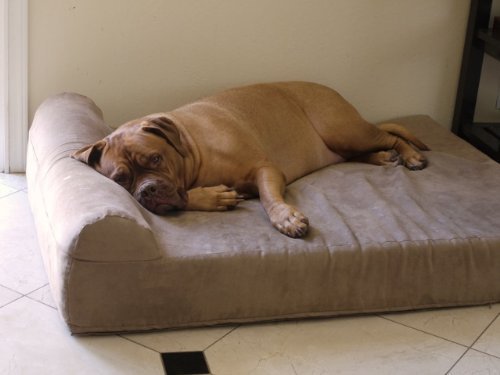
Senior Dog Care
Time catches up with everyone; including your dog. Caring for senior dogs requires a holistic approach to address their changing needs, including diet, exercise, health monitoring, mental stimulation, and appropriate supplements. Senior dogs, usually considered those aged seven and older, experience various physiological changes that necessitate adjustments in their care routine. This article provides insights into the optimal care and supplementation for senior dogs to ensure their health and well-being.

Nutrition & Diet
- Balanced Diet: Senior dogs benefit from a diet formulated to meet their unique nutritional needs. They require diets with lower calories to prevent obesity, higher fiber for digestive health and adequate protein to maintain muscle mass along with essential fatty acids for skin, coat and joint health.
- Protein: Senior dogs need high quality, easily digestible protein to maintain muscle mass without burdening their kidneys. Chicken, egg and fish are good choices to consider to add to their diet.
- Fiber: Increased fiber not only helps with digestion but also helps with regular bowel movements. As dogs age, their digestive systems can slow down and they may be prone to constipation. Vegetables like green beans, broccoli, spinach and carrots are healthy source of fiber.
- Portion Control: Watch portion sizes to prevent obesity which can be a common problem in older dogs. Obesity can worsen joint issues and also cause other health problems.
- Feeding Frequency: Senior dogs may need more frequent meals with smaller portions.
- Hydration: Since older dogs are not as active as they used to be, they might have a decreased sense of thirst, so it is crucial to ensure they they drink enough water.
- Raised Food Bowl: Senior dogs who suffer from arthritis may find it harder to reach down to their food and, therefore, prefer a slightly raised bowl.
Exercise and Physical Activity
- Regular Exercise: This will maintain muscles and joint flexibility in older dogs. Adjust the intensity and duration to suit their fitness level. Opt for shorter, more frequent walks rather than long and strenuous activities. If your dog needs to increase their fitness level, start slowly and build gradually as they increase their strength and endurance.
- Joint-Friendly Activities: Swimming is an excellent low-impact that supports joint health without straining the joints. Gentle play and interactive toys can also encourage movement.
Health Monitoring
- Regular Vet Visits: Frequent vet check-ups (at least twice a year) is necessary for early detection of age-related health issues. Regular blood work, dental checks and monitoring for conditions like diabetes, arthritis and heart diseases are crucial.
- Weight Management: Regularly monitor your dog’s weight. Both obesity and sudden weight loss are indicative of health issues.
- Pain Management: Arthritis and other conditions that cause pain, are common in older dogs. Work with your vet to manage pain through medication, supplements and physical therapy.
Mental Stimulation
- Cognitive Health: Mental stimulation is vital to prevent cognitive decline. Engage your dog with puzzle toys, new activities and environments, and training sessions to keep their mind active.
- Social Interaction: As long as your dog doesn’t show signs of aggression or nervousness, maintain social interactions with other dogs and people to prevent anxiety and depression.
- Give Time and Attention: Your dog needs just as much care and attention as he or she did as a puppy. When you give the time and care your dog deserves, you can both enjoy the years you have together.
Supplements
- Joint Supplements: Glucosamine, Chondroitin, Hyaluronic Acid are commonly used to support joint health. They help repair and maintain cartilage and reduce inflammation in joints and improve mobility.
- Omega 3 Fatty Acids: Omega 3 fatty acids help reduce inflammation and support heart, skin, and coat health. They are particularly beneficial for dogs with arthritis or skin conditions.
- Antioxidants: They combat oxidative stress and support the immune system. They may also play a role in cognitive health.
Comfort and Environment
- Comfortable Bedding: Provide orthopedic beds to support joints and ensure your dog has a comfortable place to rest. Elevated beds can make it easier for senior dogs to get in and out.
- Accessibility: Modify your home to make it more accessible. Use ramps or steps for dogs that have difficulty climbing stairs or getting onto furniture.
- Temperature Regulation: Senior dogs are more sensitive to temperature changes. Ensure they are warm in winter and cool in summer to avoid stress on their bodies.

Preventive Care
- Dental Health: Dental health is often neglected in senior dogs, leading to issues like periodontal disease, which can affect overall health. Regular dental clean-up, brushing and dental treats can help maintain oral hygiene.
- Parasite Control: Continue regular flea, tick and worm prevention. Older dogs might have a weaker immune system, making them more susceptible to infestations.
- Vaccinations: Keep vaccinations and booster shots updated. Senior dogs still need protection against common diseases.
Special Considerations
- Monitor Changes: Changes in behaviour can indicate health issues. Increased aggression, withdrawal, reluctance to engage, drinking excessive water, or changes in eating and sleeping patterns warrant a visit to the vet.
- Grooming: Regular grooming is important to maintain skin and coat health. It also allows for early detection of lumps, bumps, skin parasites or other skin issues.
- Tailored Care Plans: Every dog is different. Tailor care plans to your dog’s specific needs, considering breed, age, health status and personal preference.
Conclusion
Caring for senior dogs requires a dedicated approach to address their changing needs. Consult your veterinarian to tailor care and address any health concerns promptly. By providing attentive care and making necessary adjustments, you can help ensure your senior dog enjoys a comfortable, healthy and happy life in their golden years.
